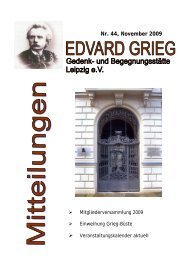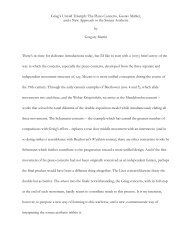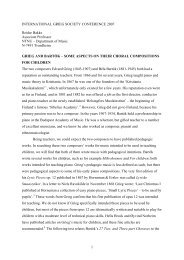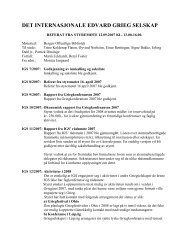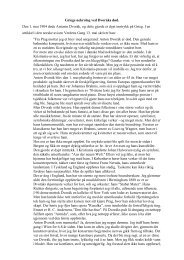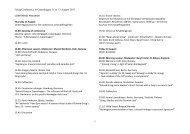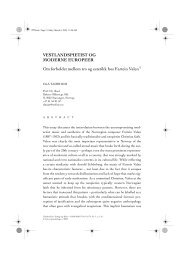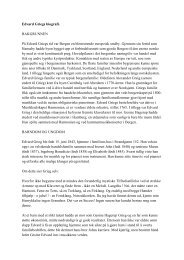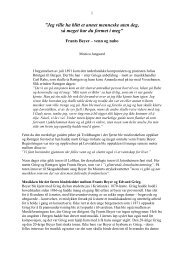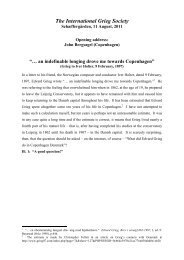Gregory Martin - paper 2007 - Grieg Society
Gregory Martin - paper 2007 - Grieg Society
Gregory Martin - paper 2007 - Grieg Society
You also want an ePaper? Increase the reach of your titles
YUMPU automatically turns print PDFs into web optimized ePapers that Google loves.
and splashes of pure and simple heart’s blood.” 54 Den Bergtekne, then, is certainly an<br />
extension of the Ballade’s musical space.<br />
So does all this talk of minstrelsy and mediaeval epic shed some light on <strong>Grieg</strong>’s<br />
work as a whole? I believe it does, and though it is beyond the scope of this essay to<br />
pursue such a line of thought too far (a more exhaustive study is forthcoming), it should<br />
at least be mentioned. While his output is receiving some much needed reappraisal, many<br />
seem to maintain a position dangerously close to that of Daniel <strong>Gregory</strong> Mason, who<br />
belittled <strong>Grieg</strong>’s “power both to assimilate previous resources and to add new ones.” 55<br />
And this is surely from comparing the proverbial apples and oranges. Placing <strong>Grieg</strong>’s Op.<br />
1 piano pieces against, say, Brahms’s Op. 118 may seem a brutal test, but in many ways<br />
is a much fairer evaluation than a comparison between Brahms’s late collections and<br />
<strong>Grieg</strong>’s more mature music. And this is because of intent. Not surprisingly, the early<br />
works fall much more within the boundary of a more Germanic ethos of original genius,<br />
as espoused by Beethoven, Brahms, and Wagner, and are therefore more liable to<br />
comparison. 56 With increasing frequency, however, <strong>Grieg</strong> attempted to abandon this<br />
approach, and such anxiousness to unfetter this new way would remain his primary<br />
artistic aim. And this included not simply a new manner of utilizing folksong or<br />
refracting Norwegian landscape through music, but more importantly a new approach to<br />
narrative agency.<br />
In The Singer of Tales, Albert B. Lord, who spent much time with the epic singers<br />
of Yuogoslavia, contends:<br />
54 Foster, <strong>Grieg</strong> Songs, 134.<br />
55 Daniel <strong>Gregory</strong> Mason, From <strong>Grieg</strong> to Brahms (New York: The Outlook Company, 1902), viii-ix.<br />
Mason also places <strong>Grieg</strong> below Dvořák, Saint-Saëns, Franck, and Tchaikovsky in his study, and evaluates<br />
each by the same criteria, as if the artistic objective and modus operandi of each were equivalent.<br />
56 This is, of course, not to belittle the often difficult relationship the German masters had with the past.<br />
28



